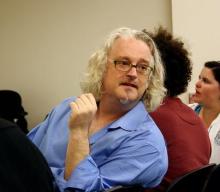CHID Director, María Elena García, is on sabbatical this quarter as well as the next. Acting Director Phillip Thurtle writes this edition’s Letter from the Director in her absence.
Hello Friends,
This has been a difficult quarter across the country and in CHID. As a close-knit learning community intent on engaging social issues, national affairs always have an impact on the CHID program. This quarter has been especially trying. The increase of hate and divisiveness surrounding the election has challenged CHID’s core philosophy that “education is a dialogic process within a learning community”.
I was especially heartened, then, to see how students, staff, and faculty have responded to these challenges. From spontaneous discussions in the office and the hallway to planned events in the CHID Lounge, the CHID community has attempted to do what it does best—build bridges to speak across difference, ignorance, and hate.
I teach in CHID because it builds bridges across disciplines, is committed to teaching as a form of compassionate engagement, and strives to link understanding with practice. For many of us in the program, these challenges have demanded that we reinvest in the core beliefs that brought us to CHID in the first place. This involves finding ways of strengthening our community so that we continue to learn from each other. This is the best that education can offer for us, for each other, and for those in our extended communities.
This has also been a difficult time financially for the College of Arts and Sciences. The College has drastically reduced funding to all programs and departments. For CHID, this has meant that we have lost the annually-allotted temporary funds we use to employ lecturers and graduate student instructors to design and offer interesting classes for our students. The program now must find new ways to balance the classes offered to students to fulfill their CHID requirements with classes that will help enrich and widen the scope of a student’s interests.
Key to this has been the continuation of the Collaborative Learning and Interdisciplinary Pedagogy (or CLIP) Fellows Program initiated by María Elena García. Next year we intend to create a cluster of classes on the topic of race and equity studies. We are also finding new and creative ways to bring faculty into the program. We are currently reaching out to sympathetic faculty to either move some of their teaching responsibilities to CHID or to join our growing body of affiliated faculty.
For instance, the popular teacher, Chandan Reddy, is moving 50% of his teaching duties from English to CHID. This will help us augment our offerings in sexuality studies, critical race theory, post-colonial studies, and Western intellectual history. CHID Alumnus Tyler Fox has also returned to campus as a lecturer in the Human Centered Design and Engineering Program and has joined our affiliated faculty. Tyler is a gifted educator with a broad knowledge of art and design. Tyler, like all CHID Affiliate Faculty, is interested in working with CHID students on independent study and thesis work.
And, finally, CHID is also working hard to develop new strategies for long-term support. This involves brainstorming new ways of funding permanent faculty as well as offering students increased support for their studies. So, as you can see, despite the challenges posed by the national political climate and the university’s fiscal climate, CHID continues to thrive, innovate, and cultivate a committed and passionate group of interdisciplinary scholars.
This issue of the CHID Newsletter testifies in detail to the many ways that CHID builds bridges. In the following articles you will find:
- CHID student Abby Talkington, reflecting on the role of neoliberalism in migration that she encountered on her recent study abroad program to Sardinia.
- Our most recent study abroad scholarship recipients, and, thanks to the generosity of our donors, the three CHID endowments that helped send these students abroad.
- An introduction to CHID's special funding campaign to hire a new CHID professor in the field of politics, aesthetics, and culture.
- Some incredible work that our students, faculty, and alumni continue to do! Please feel free to contact us if you have a project you would like to share with your fellow CHIDdies.
As we remarked before, CHID recently finished a ten-year review of our program (they said wonderful things about us!) and we eagerly await the University’s response to our review. In the meantime, we remain energized by all we need to accomplish and everything we have yet to learn. We intend to face our challenges with integrity and vision and will continue to use our research, teaching, community service, and learning to build bridges. It’s clear that the university and the nation need us now more than ever.
